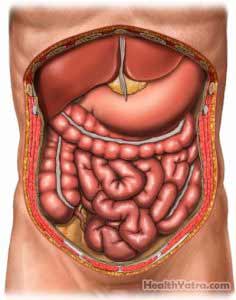تعريف
This is an open surgery of the abdomen to view the organs and tissue inside.

أسباب هذا الإجراء
This procedure is done to evaluate problems in the abdomen.
Problems that may need to be examined with an exploratory laparotomy include:
- A hole in the bowel wall
- Ectopic (outside the womb) pregnancy
- بطانة الرحم
- التهاب الزائدة الدودية
- Damage to an organ from trauma
- Infection in the abdomen
- Cancer
المضاعفات المحتملة
Complications are rare, but no procedure is completely free of risk. If you are planning to have a laparotomy, your سيقوم الطبيب بمراجعة القائمة من المضاعفات المحتملة، والتي قد تشمل:
- نزيف
- العدوى
- Blood clots
- تلف الأعضاء
- Hernia formation
- Large scars
- Reaction to the anesthesia
بعض العوامل التي قد تزيد من خطر المضاعفات تشمل:
- جراحة سابقة في البطن
- مرض السكري
- أمراض القلب أو الرئة
- Weak الجهاز المناعي
- Blood disorders
- تناول بعض الأدوية
- Smoking, alcohol abuse, or drug use
تأكد من مناقشة هذه المخاطر مع طبيبك قبل الإجراء.
ما يمكن توقعه
قبل الإجراء
المؤدية إلى الإجراء الخاص بك:
- Your doctor may perform the following:
- اختبار بدني
- اختبارات الدم والبول
- Ultrasound—a test that uses sound waves to visualize the inside of the body
- التصوير المقطعي (CT) scan—a type of x-ray that uses a computer to make pictures of the inside of the body
- Magnetic resonance imaging (MRI) scan—a test that uses magnetic waves to make pictures of the inside of the body
- التحدث مع طبيبك عن الأدوية الخاصة بك. قد يطلب منك التوقف عن تناول بعض الأدوية تصل إلى أسبوع واحد قبل العملية مثل:
- Anti-inflammatory drugs (eg, aspirin)
- Blood thinners, like clopidogrel (Plavix) or warfarin (Coumadin)
- رتب لتوصيلة إلى المنزل.
- The night before, eat a light meal. Unless told otherwise by your doctor, do not eat or drink anything after midnight.
التخدير
- General anesthesia (almost always used)—blocks pain and keeps you asleep through the surgery; given through an IV in your hand or arm
- Spinal anesthesia (used in very ill patients)—the area from the chest down to the legs is numbed
وصف الإجراء
The doctor will make one long incision in the skin on your abdomen. The organs will be examined for disease. The doctor may take a biopsy. If the problem is something that can be repaired or removed, it will be done at this time. The opening will be closed using staples or stitches.
كم من الوقت سيستغرق ؟
About 1-4 hours
كم هو مؤلم ؟
Anesthesia will prevent pain during the procedure. For pain and soreness after surgery, you will get medicine.
متوسط الإقامة في المستشفى
Several days—If you have problems, you may need to stay longer.
رعاية ما بعد العملية
في المستشفى
- You may need to wear special socks or boots to help prevent blood clots.
- You may have a foley catheter for a short time to help you urinate.
- You may use an incentive spirometer to help you breathe deeply.
في البيت
It may take several weeks for you to recover.
- اتبع تعليمات طبيبك.
- The doctor will remove the sutures or staples in 7-10 days.
- Take proper care of the incision site. This will help to prevent an infection.
- اسأل طبيبك حول, عندما هي آمنة للاستحمام, السباحة, أو نقع في الماء.
- During the first two weeks, rest and avoid lifting.
- Slowly increase your activities. Begin with light chores, short walks, and some driving. Depending on your job, you may be able to return to work.
- To promote healing, eat a diet rich in fruits and vegetables.
- Try to avoid constipation by:
- Eating high-fiber foods
- Drinking plenty of water
- Using stool softeners if needed
استدعاء الطبيب
بعد مغادرة المستشفى، اتصل بطبيبك في حالة حدوث أي مما يلي:
- حمى أو قشعريرة
- احمرار أو تورم أو ألم متزايد أو نزيف شديد أو أي إفرازات من موقع الشق
- Increasing pain or pain that does not go away
- Your abdomen becomes swollen or hard to the touch
- Diarrhea or constipation that lasts more than 3 days
- Bright red or dark black stools
- الدوخة أو الإغماء
- استفراغ و غثيان
- سعال أو ضيق في التنفس أو ألم في الصدر
- Pain or difficulty with urination
- Swelling, redness, or pain in your leg
في حالة الطوارئ ، اتصل على المساعدة الطبية على الفور.
